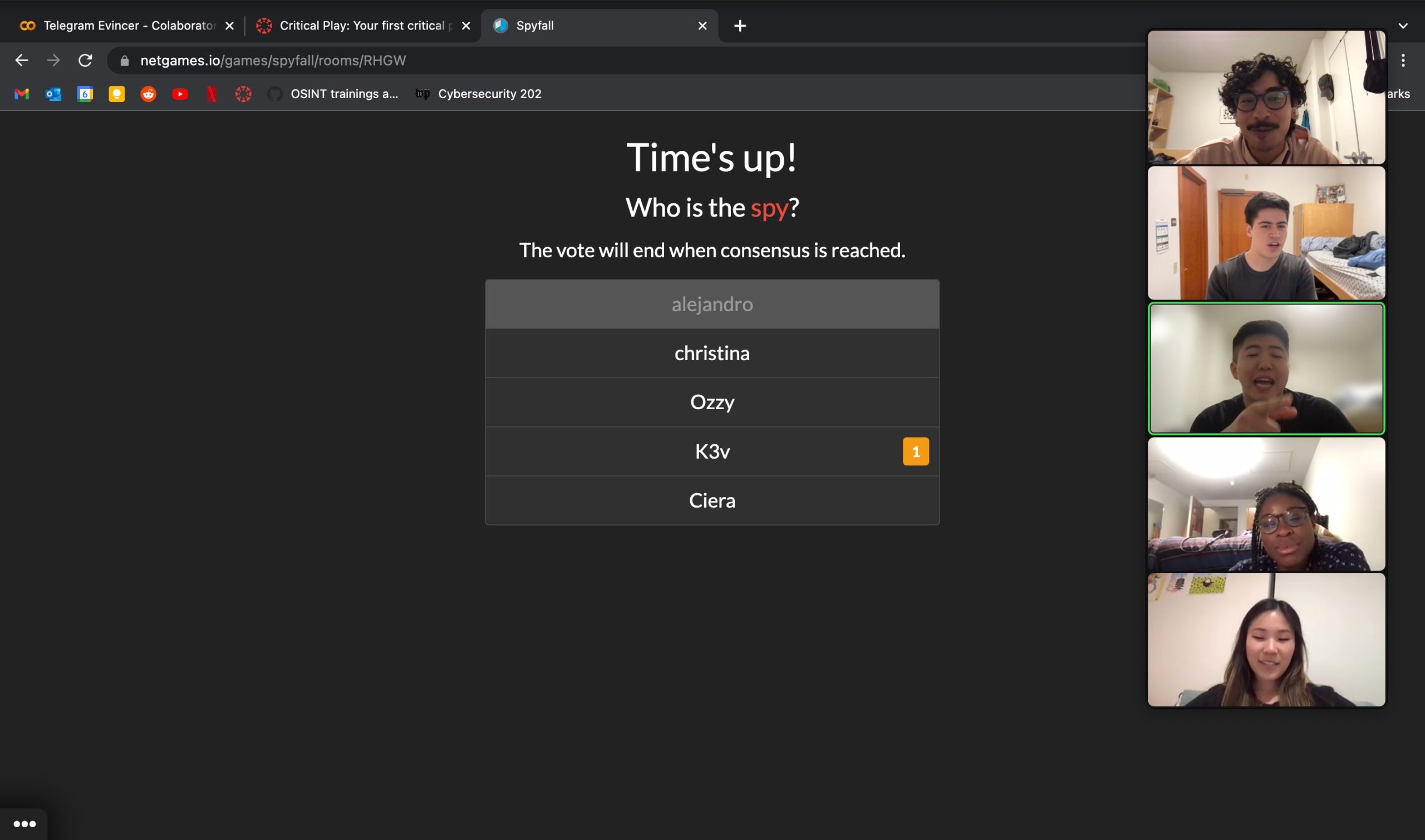Name: Spyfall
Creator: Alexandr Ushan
Platform: Desktop & Mobile [netgames.io], also available as a card-based game

Target Audience:
The publisher states that the game is intended for people aged 13 and older, and I’d agree with their assessment. It requires a degree of subtlety that might frustrate younger children.
Notable Elements
First, the premise and procedure: the game begins with each player being assigned a role. One player is the spy, while the others are not. Those who are not the spy all know a secret location that is unknown to the spy. The objective of the game is either to catch the spy (if you are not the spy) or to outwit the other players and uncover the secret location (if you are the spy). After the roles are assigned, the players all have 5 minutes to ask each other questions to see who’s telling the truth.
The game is one of unilateral competition and requires 3 or more players, though it becomes more and more imbalanced as the number of players increases. The game is very open-ended and, outside of the beginning procedure, gives the players complete autonomy during the five minutes that the game is played. The primary action being taken throughout the game is the asking and answering of questions in an attempt to discern the identity of the spy. After the game concludes, the players are free to debate amongst themselves to decide on who they think the spy is.
There are very few rules: after the roles have been assigned, players are free to act as they wish during the five minutes of interrogation. Upon the conclusion of the five minutes, the players all cast a vote for who they think the spy is, while the spy attempts to guess the location. There are two outcomes: either the majority wins by guessing the spy, or the spy wins either by not being caught or by successfully guessing the location.
The game can be played with very few resources, all that is needed is a method to assign each player a role and a list of possible locations (one of which the non-spy characters will know is the location for the round).
There are no set boundaries outside of the 5-minute duration in which the game is played.
Comparisons
The game is very similar to other games which involve one player attempting to outwit the others, such as Mafia, Werewolf, or Secret Hitler. Unlike those games, however, this one does not require any player to act as the storyteller, or ‘god’, and it is entirely possible for every player to be actively engaged in every round. I can’t make a judgment on whether it’s better or worse: it requires significantly more brainpower and is more difficult to lie when you’re the odd person out. This makes the game both more strategic (less luck-based). Whichever game is ‘better’ is highly dependent on the group’s makeup.
How It Went
I personally found this game to be super fun (specifically of the fellowship variety!), and our whole group would have happily continued playing if we were not all having to make a blog post about it the same night! I liked the game because it gave us all the chance to be creative and interact in a meaningful way. Secondly, it was continuously engaging: even when it wasn’t your ‘turn’ you still had something to do and were involved in the intrigue. I also liked it because it’s infinitely replayable and has to potential to offer a unique, memorable experience each time it’s played.
The downfall of the web version we played was that the location disappeared after the 5 minutes had begun, so if a player (me) wasn’t paying enough attention in the lobby we’d have to reset the game. This happened three times (all my bad)!
Potential Changes
If I were to address anything about this game it would be the lack of structure. The players are forced to organize their own communication during the five minutes, and more extroverted players are more likely to dominate the conversation. I might set a rule where each player individually has a turn to ask a question in each round. That said, this rule might be too restrictive. Another alternative would be to hold multiple shorter rounds and hold a vote at the end of each round, similar to Mafia. In this case, the spy is incentivized to try and guess the location early and before they’re found out.


